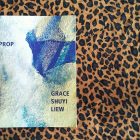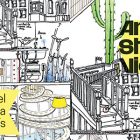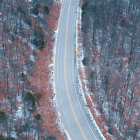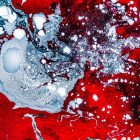The Inaugural Poem under a Trump Presidency: An Adynaton
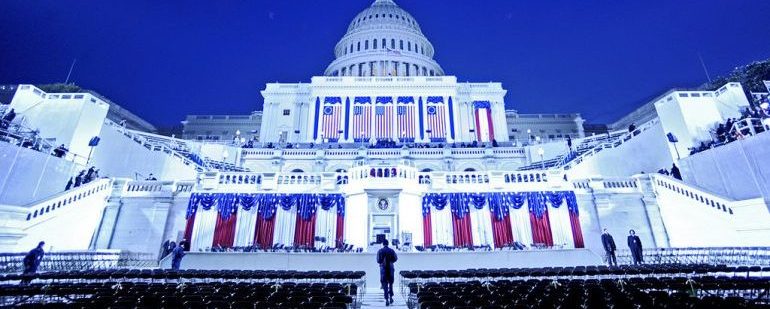
By Master Sgt. Cecilio Ricardo, U.S. Air Force [Public domain], via Wikimedia Commons
I have been thinking about that conversation over the past few months—mostly in regard to the current Republican nominee for president, Donald Trump. If Mr. Trump were to win the November election, all sorts of interesting questions arise: Would he ask someone to write and read an inaugural poem? Would the writer have to get the poem cleared by Trump and Trump staffers? Would Chachi be there? Most interesting of all, though, is this: would the poet accept the invitation.
It is a curious predicament.
On one hand, I have tried very hard, and I can’t think of any poet—any person actually—who is excited about Mr. Trump as the Commander-In-Chief. Everyone I know is offended and/or horrified by him. It seems impossible that any writer would want to associate her values with Mr. Trump’s.
On the other hand, poetry is bigger than a person. The inaugural poem is a stage; it is a clarified moment when the country (and perhaps the world) pauses for a couple of minutes to watch a poet read a poem during one of the great celebrations of democracy. Who cares who the president is, one could argue. The inaugural poem is a kind of marriage between the values of America and the values of poetry. Who the president is is almost irrelevant.
Except for many it’s not.
So, I decided to do an experiment. I gave a rather random group of poets this scenario:
It is mid-November, and Donald Trump has been elected president. You get a call from his daughter, Ivanka, who informs you that her father, the President-Elect, would be honored if you would write and read the inaugural poem for his inauguration. It turns out, one of the staffers is a huge fan of your work and showed Mr. Trump some of your poems. He was also moved and is hoping you will help him make American poetry great again. What do you say?
I know this is a bit of a set-up, and I know an email from me is much less glamorous than a phone call from Ivanka; nevertheless, I hoped to get some takers.
Here is a sampling of some of the responses:
Robert Hass: I would say to the staff member, “Thank you for your readership. I’m glad to hear you and President Elect Trump are reading poetry, the most basic art of human experience. I am not able to read my work at the Inauguration as I am currently quite unstable–delicate, deranged and dangerous. But perhaps Ivanka herself could read a poem by Emily Dickinson called ‘My life had stood a loaded gun,’ one of my Second Amendment favorites.”
Danez Smith: No
Heid E. Erdrich: I mean I love to respond. I dunno, I don’t respond much. I’m not saying I wouldn’t respond, I might respond. I was being sarcastic. But I wasn’t. You were. Talk to my lawyers.
Maggie Smith: I would say no. There might be expletives attached to the no, but in either case, it would be a quick call.
Brian Clements: I would follow the lead of Sam Hamill during the George W. Bush administration and refuse on principle to attend any event in any capacity at a Trump White House.
Ada Limón: Ooooohhhh nooooooo
Tess Taylor: I simply decline. I don’t think I would engage it further than that. I can’t imagine trying to talk or share with this particular campaign at all. I can’t imagine any poets I know would want to write anything for him.
Jane Hirshfield: No.
Bob Hicok: I’d either say that I’m busy that day washing my (lack of) hair, or I’d say yes and read a poem that begins, “America is great because if you make it to America, you’re an American.” A poem titled, “America is an embrace, not a wall.” or I’d respond that while I love oranges, orange people scare me, as their presence suggests the real alien invasion has begun.
Two of the funnier responses came from Judy Halebsky and Jennifer L. Knox. Taking my scenario even more seriously than I did, Halebsky wrote an amazing five-paragraph letter to Ivanka. While I am unable to share the letter in its entirety, I must print her hilarious third paragraph:
As for the poem, as for inauguration day, I think it’s going to be hard for me to make it to the podium, what with the protesters who I’ll be high-fiving as I try to get through the crowd. Can I do it in flats and lip-gloss? As a screed against capitalism? A love song to Marx? Here’s the plan: I’ll read my found poem composed entirely of words from Das Capital. The running time of the poem is 1 hour and 15 minutes. If you would be so kind as to permit me to take the spotlight and read my poem uncensored, I’ll be there.
I love the image of Judy high-fiving the protesters as she ascends the podium to read her Capital cento. Like Halebsky, Knox dives into the deep irony of the request. She contrasts the Republican nominee’s reliance on cliché, triumphalism, and disregard with poetry’s resistance toward those values—and she does it by way of poetry itself. Here is her poem:
This is a Terrific Poem About Me Being Elected President of the United States. It’s Called, “Color Me Tomorrow, Today.” [shrugs] That’s Weird, But It’s Really a Terrific Poem, Folks. The Best.
“Gird your loins, small handed men!”
I like that [crowd hoots]. “Strike up a wench-
pithy polka to which…” [eyes dart left,
makes stink face] “…teeeyou wheech…”
[makes fey gesture with his tiny hand,
crowd goes bananas] It’s a poem, folks!
[crowd haws] OK, back to the poem:
“For every goodly human in this football
stadium here today, I sayeth unto thee…“
[eye roll] It’s like the frickin’ Bible [yee-haws]
“I am scared of new words and mirrors” ?
“I am a trapped raccoon man” ?
What is this shit? [hands poem to giant
glowing hairless toxic waste baby in front row,
baby eats the poem, glows brighter] Lookit that!
[points, crowd applauds, caws, makes lawn mower/
machine gun sounds]. Now that’s the power
of poetry, folks! [President ascends on wires].
Dana Levin sent what is perhaps the most sobering response. Halebsky referenced censorship, but Levin worries, understandably, about punishment and about guilt by association:
My first reaction is Dear. God. My second reaction is to think of Osip Mandelstam, sent to the gulag for excoriating Stalin in a poem. I like this translation by John Simkin:
We live, deaf to the land beneath us,
Ten steps away no one hears our speeches,
All we hear is the Kremlin mountaineer,
The murderer and peasant-slayer.
His fingers are fat as grubs
And the words, final as lead weights, fall from his lips,
His cockroach whiskers leer
And his boot tops gleam.
Around him a rabble of thin-necked leaders –
fawning half-men for him to play with.
The whinny, purr or whine
As he prates and points a finger,
One by one forging his laws, to be flung
Like horseshoes at the head, to the eye or the groin.
And every killing is a treat
For the broad-chested Ossete
How could I work for a man and administration without becoming one of the “fawning half-men”? It would not be possible. Would I politely decline such an invite, or use it as a vehicle of public protest, or slink into the wilderness without answer, in hopes I can wait out the regime? I don’t have an easy answer, but it’s extraordinary to be in an election cycle where I think about these scenarios, where I have to wonder how politically and physically oppressive a Trump administration might be, if he would become the big daddy fascist (pax Plath) the nation adores.
Levin’s smart and scary imaginings are the best argument against my earlier claim that poetry is bigger than a person. Would Levin or Halebsky or Knox be sent to the gulag for reading a critical poem at Mr. Trump’s inaugural? No, but nowadays there are crueler and more effective ways to punish a writer.
In his great poem “Deber el Poeta,” commonly translated as “The Poet’s Obligation,” Pablo Neruda claims that as part of his role as a poet he must “feel the crash of the hard water.” Matthew Zapruder seems to suggest, ultimately, our obligation as poets is to, as Neruda puts it, “be present with an errant wave.”
Yeesh. I’d like to think this scenario is impossible, for multiple reasons. First, electorally. Plus, I feel like if Donald Trump liked my poetry, I would be doing something wrong, though then again, maybe we can imagine a poem that is such a tenderly accurate missile of golden imaginative energy that it could find its way past or through whatever is encasing that poor man’s soul. I’m not sure I’ve ever written one that’s capable of such a dangerous mission, but who knows.
As far as whether under this completely horrifying set of circumstances I would actually deliver the inaugural poem … my first reaction is No. Effing. Way. I couldn’t imagine feeling good about lending an iota to that travesty. But then I start to think, that the vision of government to which I hopefully and probably naively subscribe is that it belongs to everyone, which is precisely why I am so opposed to Trump’s attempts to become the American Putin. So I guess I would try to write a poem that provides an alternate vision, something that is not full of nationalist sentimentalism, or just another version of political speech, but something that makes contact with the imaginations of all our citizens. That would be a pretty tough task in those circumstances, maybe impossible, but I guess I think it’s our job as writers to try.
One of the questions I’m asked most often—by both students and non-writers—is what I think the role of poetry is. I love this question because it is one I ask myself almost every day. However, I’ve been thinking about it differently over the past few months as the debates, speeches, and interviews have made me revisit a great many things about truth, language, power, clarity, and efficacy. This has been the least poetic campaign in recent memory; so it would seem that we desperately need poetry and a powerful inaugural poem. I’m not sure poetry has the power to change things externally, but I do think it can incite internal revolutions or at least interior uprisings.
This does not mean a poet should say yes or no to Mr. Trump’s invitation. It just means poetry doesn’t need him or his inaugural spotlight to make America America. Again.
